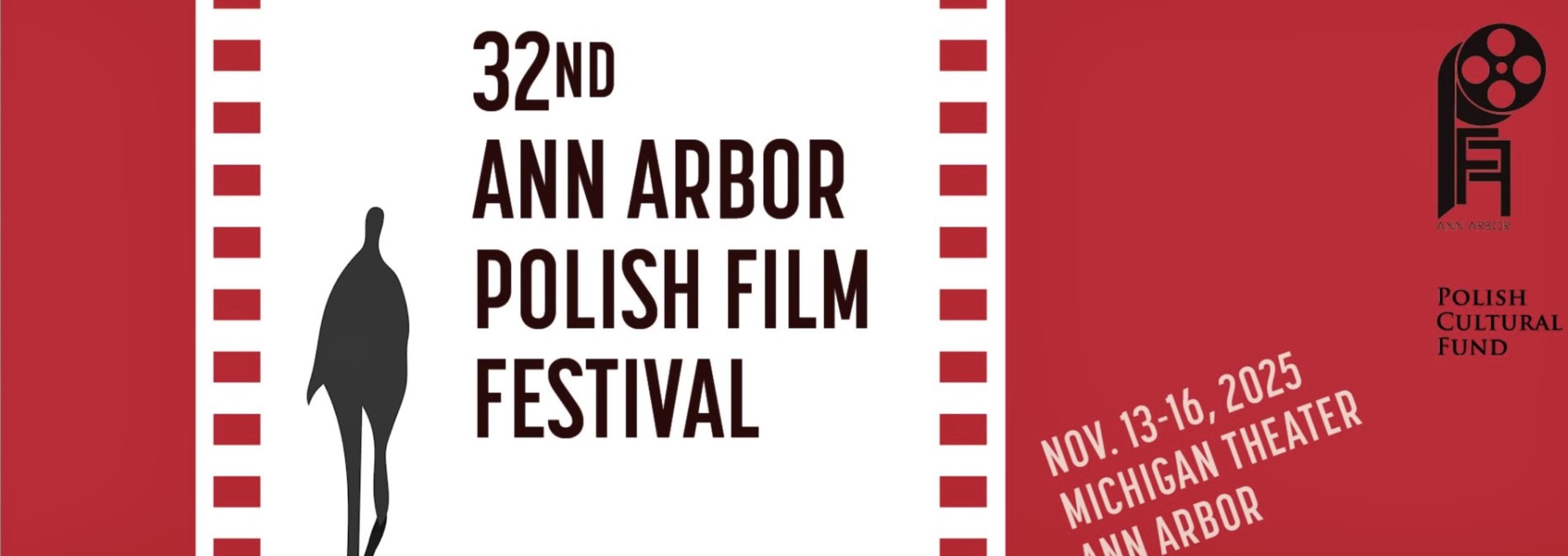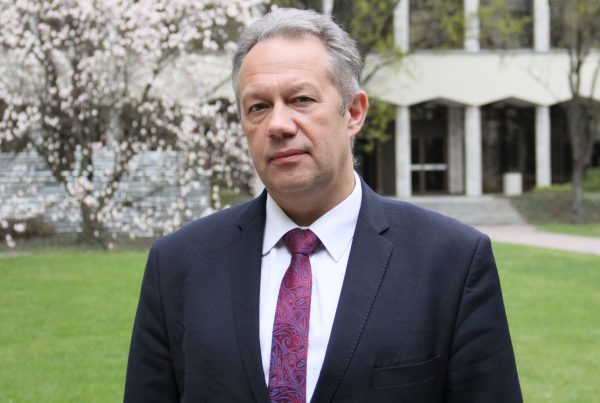In only a few days, on Thursday November 13, the Ann Arbor Polish Film Festival (AAPFF) will open its doors for the 32nd time. This year the diverse and exciting festival program will offer five new Polish feature films, five documentaries, five short films, a children’s program and a groundbreaking film program for deaf people, the newest addition to the already multifaceted festival. Among the feature films, Franz Kafka/Franz, the Polish entry into the 2026 Oscar contest, Chopin, Chopin!/Chopin, a Sonata in Paris, Vinci 2, Simona Kossak and – for children, and anybody young at heart – O psie, który jeździł koleją 2/The Dog Who Travelled by Train 2.
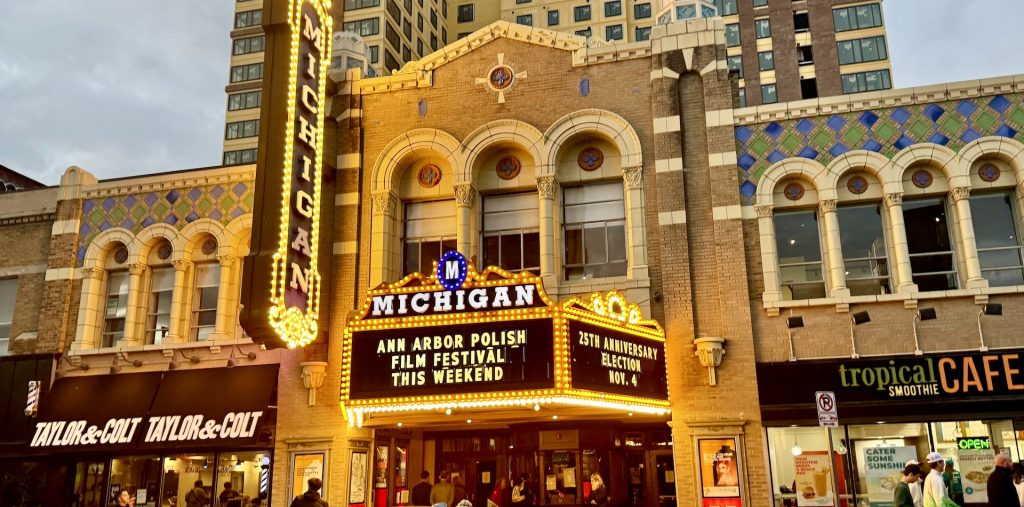
When the Ann Arbor Polish Film Festival (AAPFF) was founded in 1993, Ann Arbor was already the home of the Ann Arbor Film Festival (AAFF), which “is the oldest avant-garde and experimental film festival in North America, founded by George Manupelli in 1963.” (https://www.aafilmfest.org/)
This was not, however, what inspired Jolanta Nowak, the festival’s founder. What gave Ms. Nowak the idea and provided the films, was the Chicago based Polish Film Festival in America (PFFA). This biggest film festival in America, was established and run by Krzysztof Kamyszew.
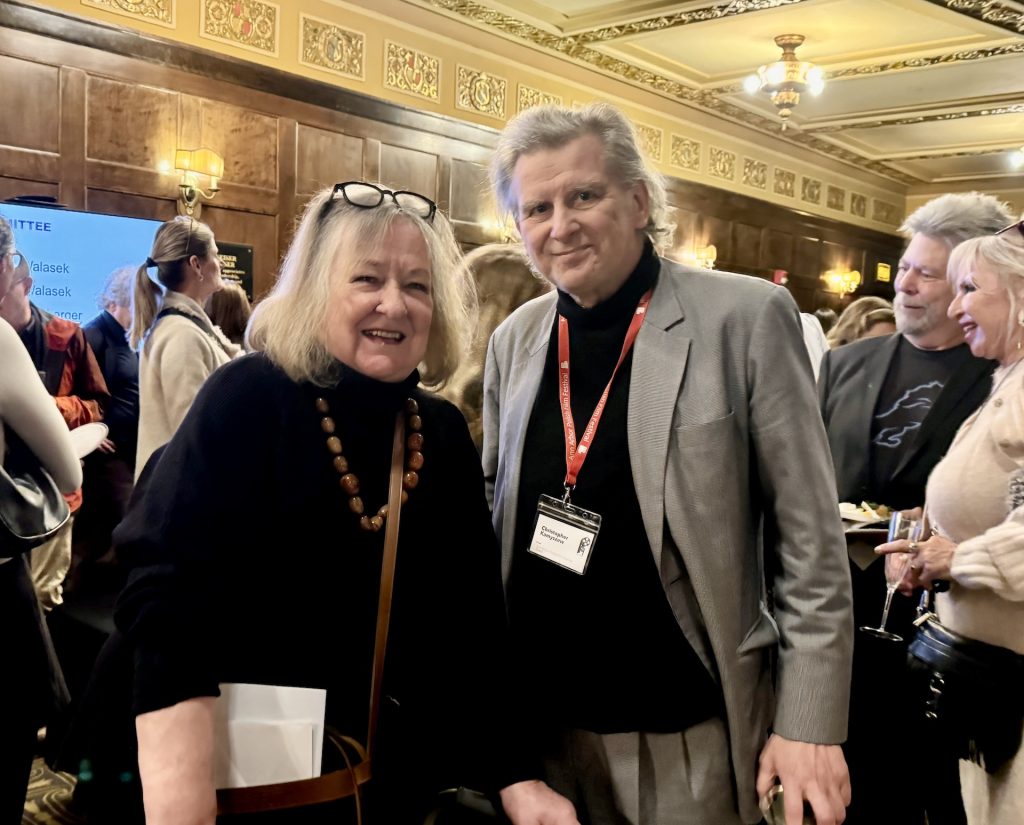
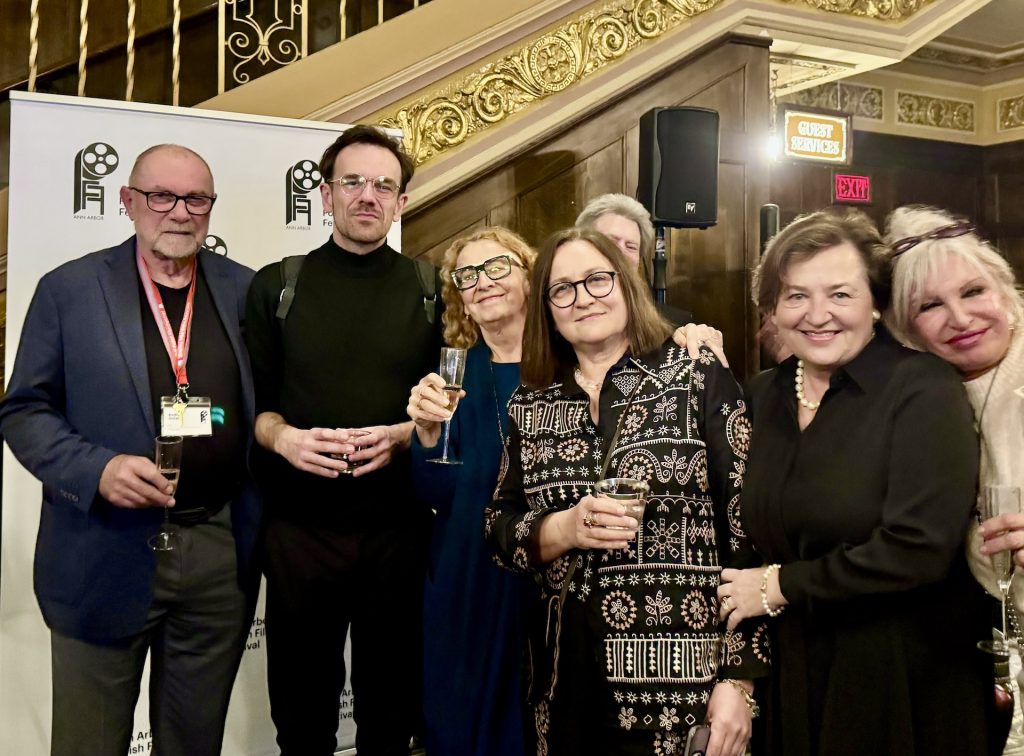
Jolanta Nowak, along with Zbigniew Pasek, and supported by a group of Polish cinephiles, among them Andrzej Dolata and Andrzej Myc, started what became one of the most significant annual cultural Polish events in Michigan. Due to a small budget, during the first years the screenings were held in different university halls, including Lorch Hall, bake sales before the films provided some of the funds, and the film reels – usually of films which were two or three years old – were often driven to Ann Arbor from Chicago.
Today the festival is held at the magnificent Michigan Theater, has an organizing committee comprising eleven members, and the financial backing of the non-profit Polish Cultural Fund – Ann Arbor (with Andrzej Dolata as its President), its main organizer. From the very beginning the Ann Arbor Polish Film Festival has been also sponsored by the Polish Student Association UM and this sponsorship demonstrates the festival’s important connection with the University of Michigan and its academic community. As it was in its first years, the Festival is still ran by a group of dedicated and enthusiastic volunteers.
Over the years the festival has been promoting Polish cinema (all of the films shown have English subtitles) and has offered unique opportunities to see brand-new Polish films. In 2005 AAPFF added to its program two film competitions, for the best documentary and a short film. This year 33 documentaries and 40 short films competed for three awards, which are the ‘Ewa Pięta Award’ for Best Documentary, the ‘Annette and Waldemar Raczkowski Award’ for Best Short Narrative, and the ‘Andrzej Dolata Award’ for Best Film Debut (Documentary or Short Film). Ten finalists, selected by the jury, will be shown during the Festival; which filmmakers will get the awards, however, will be revealed only during the Festival Opening Gala, on Friday, November 14 at 6 pm. The awards are $1000.00 each, the list of the 10 finalists is available on the festival’s site and there are still tickets available to the Gala.
A day before the Gala officially opens the 32nd AAPFF, on Thursday evening, the public will be able to view three of the jury-selected documentaries. The first of them (at 6:30 pm, at the State Theater), Fantastyczny Matt Parey/Fantastic Matt Parey (directed by Bartosz Paduch, 79 min) tells the story of Maciej Parowski, a very influential writer and editor called “the godfather of Polish science fiction” for he discovered and nurtured a great many Polish SF and fantasy writers, including Andrzej Sapkowski (interviewed in the film) and Tomasz Bagiński. After the film, there will be Q&A with the film director.
The biggest festival draws this year most likely will be two films: Agnieszka Holland’s Franz, with the screening scheduled after the Opening Gala, on Friday November 14 at 7:30 pm, and directed by Michał Kwieciński Chopin, Chopin!, which will close the festival (Sunday, November 16 at 2 pm).
Both brand-new films (their distribution in Poland started only last month) are highly anticipated and critically acclaimed period biographical dramas.
In his review of Franz Bartosz Staszczyszyn (https://culture.pl/pl/dzielo/franz-kafka-rez-agnieszka-holland) is praising Agnieszka Holland for “stylistic bravery “and “intellectual curiosity”, and introduces the film as follows: “Agnieszka Holland creates a story about the attempt to understand another person, their work, and their personality. The director searches for the real Kafka in biographical accounts, the writer’s letters, and the stories of his friends, family, and researchers. She draws on his work, attempting to distill her own image of Kafka from them.” Agnieszka Holland was awarded Silver Lions for Franz at this year’s Gdynia Film Festival. Watch the trailer:
The second potential festival blockbuster Chopin, Chopin!, starring Eryk Klum as Frederic Chopin, opened this year’s Gdynia Film Festival. Labeled the “Polish Amadeus” the film is praised for its very attractive, modern, electrifying way of portraying the last years of Chopin’s life in Paris. Awarded best production design and best costume design at the festival, this is one of the most expensive Polish film productions. Watch the trailer:
Equally attractive to festival-goers might be two other feature films for adult audience, a criminal comedy and the sequel to a 2004 comedy heist Vinci (and also directed by Juliusz Machulski) Vinci 2 (starring Robert Więckiewicz, Borys Szyc, Kamilla Baar and Marcin Dorocinski) and last year’s production of Simona Kossak (directed by Adrian Panek, starring Sandra Drzymalska, Jakub Gierszal, Agata Kulesza and Borys Szyc), which shows the astonishing life of the legendary Polish naturalist and zoologist Simona Kossak, who lived in the Białowieża Forest and studied animals. Both films will be shown on Saturday evening: get ready for a double feature, at 7 and 9 pm. Watch the trailers:
The feature proposition for a younger audience, directed by Magdalena Nieć The Dog Who Travelled by Train 2 (at 10 am, on Saturday) was enthusiastically received in Poland. Recently Polish children’s cinema, previously neglected, grossly underfunded, and unable to compete with foreign productions, has been growing, and offering films which are very well liked by Polish audiences as well as achieve some measure of international success.
A new addition to the festival this year is d/Deaf Cinema Program, which is scheduled also on Saturday, 1- 2:45 pm. This segment of the festival consists of short films, video art and one animated short film, followed by the Q&A session with Prof. Magdalena Zdrodowska, CCPS Widzinski Visiting Fellow. Then at 1:30 pm the documentary Szumy i fonie/Hushes and Phonics, directed by Piotr Kamiński, a winner of the last year Festival, a compelling story of a deaf mother and her young son will be shown.
The soft opening of the festival is on Thursday, the official opening is on Friday, but already on Tuesday Professor Jarek Bujny will present Polish Poster School: An Eye on Film (at the Downtown Library, 4th Floor Program Room). As we read in the lecture announcement: “The Polish School of Poster Art is internationally recognized as one of the influential forces in 20th century graphic art”.
Organizing the annual Ann Arbor Polish Film Festival takes a lot of effort, time and money, but first of all, passion. The organizing committee works a good part of the year preparing the film line-up, finding sponsors and running the competitions. In addition to the two competitions already mentioned, this year there are two children’s competitions, for the best film review and for an artwork depicting a film hero. An exciting part of the festival is meeting with the festival’s guests. Over the years, among them were such masters of cinema as Agnieszka Holland, Krzysztof Zanussi and Kinga Dębska as well as new upcoming directors and actors (Marek Probosz in 2014) and Krzysztof Kamyszew, the director of Polish Film festival in America.
It is amazing that such a large and professional film festival for so many years has been organized by a group of volunteers. Hats off to you, ladies and gentlemen!
Below is the quick guide to the Festival.
A QUICK GUIDE TO THE 32ND ANN ARBOR POLISH FILM FESTIVAL
All films have English subtitles. Free admission to documentary and short film screenings. Tickets available online (click on the links.) All the festival information is on the festival site: https://www.annarborpolishfilmfestival.com/program/
TUESDAY, NOVEMBER 11, 6:30pm to 7:30pm, Downtown Library, 4th Floor Program Room, Ann Arbor: Polish Poster School: An Eye on Film, lecture by Prof. Jarek Bujny https://www.annarborpolishfilmfestival.com/polish-poster-school-an-eye-on-film/
THURSDAY, NOVEMBER 13, STATE THEATRE:
6 pm – screening of the jury selected documentary Fantastic Matt Parey, followed by the Q&A with director Bartosz Paduch.
8:30 pm and 9:30 pm – two jury-selected documentaries about the effect of the Russian-Ukrainian war, Robbed of Childhood and The Survivors
https://www.annarborpolishfilmfestival.com/november-13/
FRIDAY, NOVEMBER 14, MICHIGAN THEATER:
6:00 pm – Opening Gala and awards
7:30 pm – film Franz Kafka/ Franz, dir. Agnieszka Holland, 127 min.https://www.annarborpolishfilmfestival.com/november-14/
SATURDAY, NOVEMBER 15, MICHIGAN THEATER:
A full day filled with programs, including a10 am screening of the children film The Dog Who Travelled by Train 2, afternoon special deaf cinema session, short films screenings and evening screenings of Simona Kossak and Vinci 2.
The detailed program is here:
https://www.annarborpolishfilmfestival.com/november-15/
SUNDAY, NOVEMBER 16, MICHIGAN THEATER:
1 pm and 1:30 pm – two jury selected documentaries,
2 pm – Chopin, Chopin! / Chopin, a Sonata in Paris, dir. Michał Kwiecinski, 133 min, 2025 https://www.annarborpolishfilmfestival.com/november-16/

